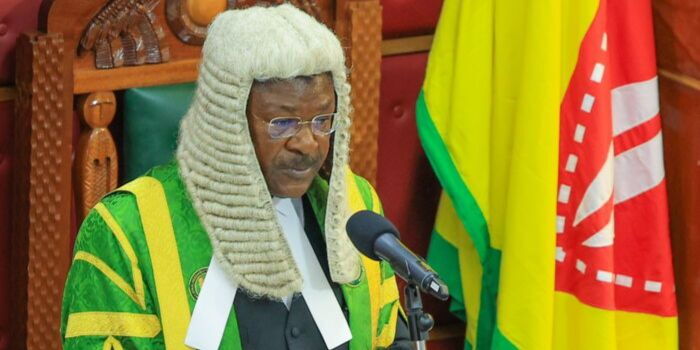National Assembly Speaker Moses Wetang’ula has defended President William Ruto regarding the recent nominations for the new leadership of the Independent Electoral and Boundaries Commission (IEBC).
Speaking on Sunday during an event in Tinderet, Nandi County, Wetang’ula made it clear that President Ruto did not personally choose the new IEBC chairperson and commissioners.
Instead, he explained that the President is simply following a constitutional process, and the final decision lies with Parliament.
“The President is not the one appointing the commissioners. He is just a link in a legal procedure,” Wetang’ula explained.
“It is Parliament that has the final say on whether the nominees are approved or rejected. We must stop the habit of opposing everything just because we didn’t come up with the idea.”
Last Thursday, President Ruto forwarded the name of Erastus Edung Ethekon from Turkana County as his nominee for IEBC chairperson.
He also nominated six individuals to serve as commissioners and submitted their names to Parliament for vetting and approval.
However, this move sparked criticism from the opposition, particularly from Wiper Party leader Kalonzo Musyoka. Kalonzo accused the President of acting outside the recommendations of the National Dialogue Committee (NADCO) by unilaterally nominating the IEBC officials.
“You can’t be both a player and the one choosing the referee,” Kalonzo said. “As one of the principals during the NADCO talks, I wrote to both Ruto and Raila Odinga, but I never received any response. We will not sit back and let this happen easily.”
In response, Wetang’ula dismissed the opposition’s claims and advised anyone unhappy with the nominations to present their concerns to the Justice and Legal Affairs Committee (JLAC), which is responsible for handling the vetting process.
According to Article 250(2)(b) of the Kenyan Constitution, the process of appointing officials to independent commissions like the IEBC involves the President submitting the names to the National Assembly. The JLAC then carries out a vetting process and prepares a report recommending either approval or rejection.
Once the JLAC completes its report, the entire National Assembly will debate and vote on it. A simple majority vote determines whether a nominee is accepted or not.
If a nominee is rejected, the President must choose another candidate and begin the process again. If the nominee is approved, the President will formally appoint them through an official gazette notice.
Wetang’ula’s comments were aimed at demystifying the nomination process and discouraging political narratives that mislead the public about the President’s constitutional role.
He urged leaders to respect the legal procedures in place and allow institutions like Parliament to do their work independently.
Join Gen Z New WhatsApp Channel To Stay Updated On time https://whatsapp.com/channel/0029VaWT5gSGufImU8R0DO30


